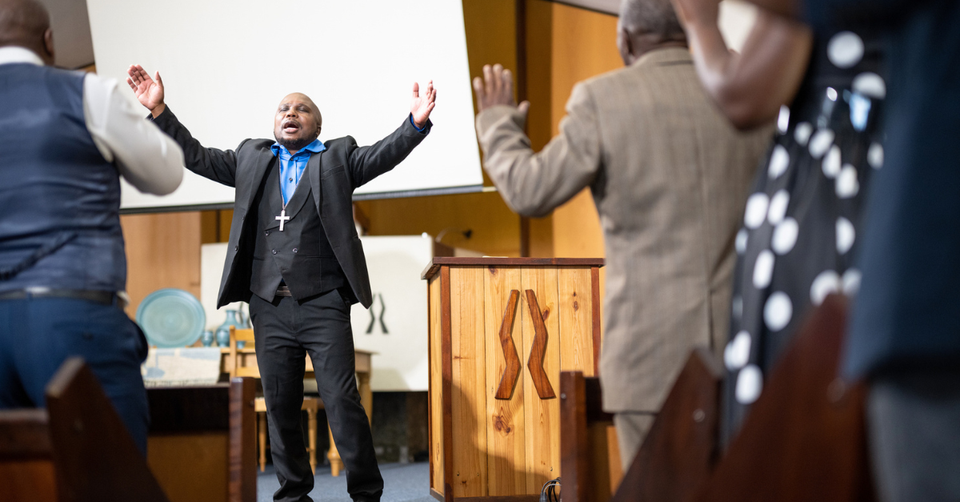Think You’re Safe? 3 Pride Traps That Could Derail Your Leadership

Most of us who have been in or around the church for any length of time have seen leaders fall, fail, burn out, and even leave the faith. The faithful leader who lives steadily and honorably until the end seems like a rare occurrence. The scriptures give warning about many pitfalls and temptations leaders face. Luke’s gospel provides particular models and warnings for the Christian leader.
In the early chapters, Luke mentions governmental and religious leaders by name. (1:5; 2:1-2; 3:1-2) He names two Caesars, multiple governors and kings and tetrarchs, and two High Priests. Luke takes pains to make a detailed historical account, but he also reveals something more subversive. Though these leaders understand themselves as central to the historical drama, Luke shows that they exist in the background, as reference points to the redemptive work God is doing. Luke also names humble people like Zechariah, Elizabeth, Mary, Joseph, and John. These are the ones who participate in the history-shaping movement of God. These characters are true leaders in Luke’s vision. In this early part of the narrative, Luke shows how God is the protagonist of history, not Caesars, not Governors, and not High Priests. Humans participate in the great drama, so the cast is important, even crucial to the narrative God is developing, but always in supporting roles.
What happens when leaders give in to the temptation of believing they are the protagonists? Pride results, and with the pride, at least three pitfalls.
Pride is difficult to avoid in general, because it can be abstract, elusive, and ubiquitous. The world, the flesh, and the devil constantly apply pressure to deform our character—often by drawing us to pride. I find it helpful to recognize that temptations are always concrete and specific. We are never tempted by abstract-pride. Rather, we are drawn to very specific thoughts, attitudes and actions. I think of them as traps that, by God’s grace, we can learn to recognize and avoid. Following are three specific prideful traps I’ve seen in my own journey, along with some ways to recognize and avoid them.
Trap #1: “If I don’t do it, nobody will.” – The Over-Responsibility Trap
My mom, may her loving soul rest in peace, was a highly responsible person. I’m sure that responsibility would have been in her top 5 in Clifton Strengths[3], and I suspect she would have identified as an Enneagram 1[4]. Mom’s sense of responsibility often drove my sister, brother, and me to high performance in our endeavors. When a need or opportunity arose, she would remark, “if you don’t do that, nobody will.” For me, those words gave birth to a deep sense that I was responsible to fill needs and achieve opportunities, and that I was at fault for the unmet needs that remained. Once I entered into Christian leadership, that sense of responsibility became a heavy burden to bear.
To what extent do you feel this burden of responsibility for the needs of the world? As a maturing Christian, I have begun to replace my sense of responsibility with a posture of discernment, asking the Holy Spirit what burdens are mine to carry and which ones I am to entrust to him and others. Discernment requires me to STOP long enough to recognize what I feel, and then to pray for God to show me what is my calling and what is not. If God is the primary leader in history, and if our world is animated by the movement of the Spirit, then my leadership is more stewardship and cooperation than responsibility.
I’m struck that in Luke, Mary responds to the “responsibility” of bearing and raising the Son of God with gratitude and worship for what God has done and will do, rather than a sense of pressure and expectation (Luke 1:46-55). Leadership built on responsibility is a trap that often leads to burnout or toxicity.
Trap #2: “I’m special” – The Self-Absorption Trap
Of course, you ARE special. God made you uniquely and has prepared good works for you to do. However, I find that often in Christian circles, we get strangely obsessed with ourselves. We take gifts and temperament assessments and spend a great deal of energy focused on ourselves. I actually find the assessments valid and helpful—it’s the obsession that traps us, because we lose sight of God as the prime mover in our world and we over-estimate our contribution. When we spend more time thinking about our uniqueness than thinking about God, it’s a trap. Also, when we obsess over our special-ness, we sometimes lose sight of our common-ness and fail to serve others with humility. In my decades of working with campus ministers, I have noticed a struggle for those who gain notoriety. After speaking or performing at a large conference or gaining impressive affirmation, a minister sometimes (thankfully, not always!) loses the willingness to serve the community in menial ways. Sadly, an inappropriate sense of uniqueness can steer a leader toward pride and away from worship.
What is your status with regard to this trap? If you feel self-focused in this season, consider doing these two things. First, stop and give thanks to God. Spend at least 30 minutes remembering and writing down what you are grateful for. Second, find at least two opportunities a week to do menial service for others, especially if it won’t be recognized. Pray that the Spirit would teach you worship in humility. I again take note of Mary, who is given perhaps the most honored and unique role in history—and yet her response is to remember her own low estate and to give praise to the God who uses common people in extraordinary ways. Leadership oriented around the special-ness of individuals moves us away from worship and into arrogance.
Trap #3: “I am the smartest person in the room” – The Comparison Trap
This trap is perhaps more obvious. I don’t see Christians preaching that we must be the smartest person in the room, but I certainly see the same dynamics of comparison in myself and others. I work in a university ministry, and we absorb aspects of university culture—both the blessings and the sins. Our community has a bent toward nuance, complexity and intellectual pride. Complexity is part of God’s beautiful creation, but intellectual pride is from hell. I too often feel magnetically drawn to a posture of analytical critique of others, and when I am falling into that trap, I fear critique coming back at me. Both critique of others and fear that others might critique us, tends to dehumanize. Of course, comparison can afflict us in many ways. Regardless of subject, comparison and critique lead us away from worship and into insecurity and pride. True worship, in fact, frees us from this trap. When our focus is gratitude and praise, we are appropriately humbled and attuned to God’s love.
In your journey of leading, how much do you compare yourself to others? Try taking note of your thoughts about those around you for a few days, and notice if you are measuring or comparing. When you notice comparison, begin consciously choosing to pray for blessing and success and growth for the person you are measuring.
As Christian leaders, we must beware of the prideful traps around us. When we are aware of them, we can choose to move in the opposite direction through disciplines of gratitude, blessing, service, and worship. There are many other traps out there—I’ve just named these three because I often fall into them myself. By the grace of God, there is always an opportunity for repentance when we are specifically drawn to pride. Along with turning from temptation, the Spirit leads us to cooperate with his forming work in us and his redemptive work in the world. My book Formed to Lead: Humility, Character, Integrity, and Discernment (InterVarsity Press, 2025) is a guide to the Spirit’s work of formation in leaders. The book looks closely at the beginning of Luke’s gospel for keys to our formation flourishing along with our calling.


Originally published August 20, 2025.




